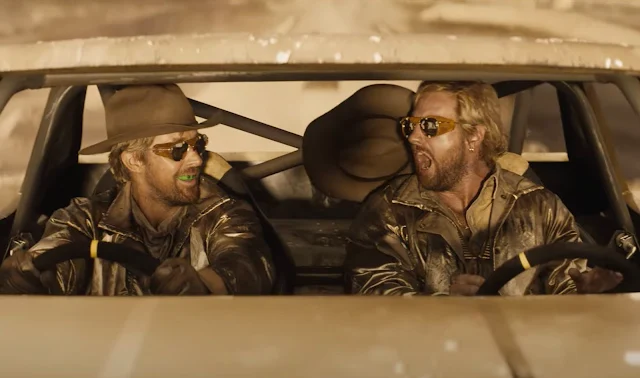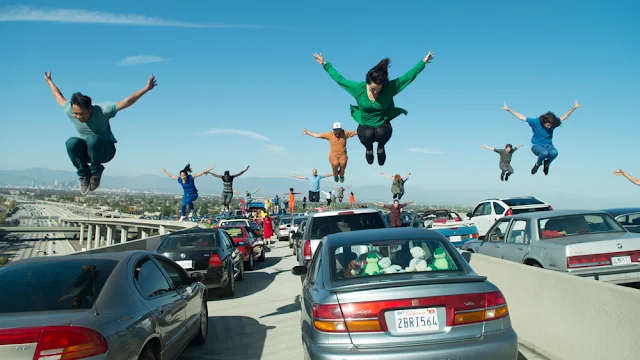A blog formerly known as Bookishness / By Charles Matthews
"Dazzled by so many and such marvelous inventions, the people of Macondo ... became indignant over the living images that the prosperous merchant Bruno Crespi projected in the theater with the lion-head ticket windows, for a character who had died and was buried in one film and for whose misfortune tears had been shed would reappear alive and transformed into an Arab in the next one. The audience, who had paid two cents apiece to share the difficulties of the actors, would not tolerate that outlandish fraud and they broke up the seats. The mayor, at the urging of Bruno Crespi, explained in a proclamation that the cinema was a machine of illusions that did not merit the emotional outbursts of the audience. With that discouraging explanation many ... decided not to return to the movies, considering that they already had too many troubles of their own to weep over the acted-out misfortunes of imaginary beings."--Gabriel García Márquez, One Hundred Years of Solitude
Search This Blog
Thursday, February 6, 2025
The Fall Guy (David Leitch, 2024)
Cast: Ryan Gosling, Emily Blunt, Aaron Taylor-Johnson, Hannah Waddington, Teresa Palmer, Stephanie Hsu, Winston Duke. Screenplay: Drew Pearson. Cinematography: Jonathan Sela. Production design: David Scheunemann. Film editing: Elisabet Ronaldsdóttir. Music: Dominic Lewis.
Tuesday, September 22, 2020
The Place Beyond the Pines (Derek Cianfrance, 2012)
 |
| Ryan Gosling and Eva Mendes in The Place Beyond the Pines |
Cast: Ryan Gosling, Bradley Cooper, Eva Mendes, Ben Mendelsohn, Emory Cohen, Dane DeHaan, Mahershala Ali, Harris Yulin, Rose Byrne, Robert Clohessy, Bruce Greenwood, Ray Liotta. Screenplay: Derek Cianfrance, Ben Coccio, Darius Marder. Cinematography: Sean Bobbitt. Production design: Inbal Weinberg. Film editing: Jim Helton, Ron Patane. Music: Mike Patton.
There's a line in the middle of The Place Beyond the Pines that perhaps echoes more in the year of George Floyd than it did even in the year the film was released. A veteran cop named Deluca (Ray Liotta) is praising the rookie Avery Cross (Bradley Cooper) for taking out robbery suspect Luke Glanton (Ryan Gosling), who crashed through a window and died after they exchanged gunfire. Deluca says he's been on the force for years and has only had to draw his gun two or three times, and here Avery is with a righteous kill at the start of his career. "And he was white," Deluca adds, marveling, as if killing any other kind of suspect would be routine. To his credit, Avery is not so happy about the kill, aware that he shot first and that he maybe doesn't really deserve being celebrated as a hero. Before long he will finger Deluca as a key figure in the corruption of the Schenectady, N.Y., police department. Avery has a law degree, but he joined the force -- over the objections of his father, a judge (Harris Yulin) -- because he wanted firsthand experience of law enforcement, so he parlays his exposure of the bad cops into a job as an assistant D.A., and 15 years later is running for state attorney general. But this is, as director Derek Cianfrance has said, a fable about the sins of the fathers. Both Avery and Luke had infant sons at the time of their encounter, and the boys are fated to meet. The movie actually begins with Luke's story: When he learns that he has fathered a child with Romina (Eva Mendes), Luke quits his job as a carnival motorcycle stuntman and tries to settle down and become the boy's father. Romina isn't too happy about this: She has moved on and married Kofi Kancam (Mahershala Ali), who is the only father the boy, named Jacob, will ever really know. Luke's efforts to go straight don't last long: Wanting to earn money to help support his son, he gets involved in a string of bank robberies, which eventually lead to the confrontation with Avery that results in Luke's death. The paths of Jacob (Dane DeHaan) and Avery's son, A.J. (Emory Cohen), finally cross in high school. A.J., who has been sidelined by his father's political ambitions, has turned into a swaggering, partying adolescent, and he gets Jacob into real trouble that eventuates in a confrontation with the man who killed his father. Cianfrance delivers a vivid crime thriller, but the film is a little overwhelmed by its epic ambitions, especially the thundering coincidence of the meeting of Jacob and A.J., which the filmmakers want us to see as a mythic working out of fate, but which really boils down to old-fashioned melodrama. The 140-minute run time also betrays the film's slackness, and the starry casting, especially of Ryan Gosling in a role that ends halfway through the movie, doesn't pay off very well. Fine actors like Ali and Rose Byrne (as Avery's wife) are wasted in tiny parts. In short, ambition is as much Cianfrance's undoing as it is that of his characters.
Wednesday, March 11, 2020
Drive (Nicolas Winding Refn, 2011)
 |
| Carey Mulligan and Ryan Gosling in Drive |
I wasn't surprised, in reading about Drive after I watched it, to find the film being compared to Sergio Leone's Dollars trilogy of the 1960s. Both, of course, feature a protagonist with no name who has a slight oral fixation -- a cheroot in the case of Clint Eastwood in the Leone films, a toothpick in the case of Ryan Gosling in Nicolas Winding Refn's. And both are taciturn and impassive, Eastwood with his squint a little more consistently menacing than Gosling with his bland, unemotional mien. The difference is that Gosling makes us sense that there's something going on deep inside, behind that façade, but we won't really know what it is until he stomps a man to death in an elevator late in the film. With Eastwood it's more a matter of what you see is what you can expect to get. I admire the style with which Refn pulls off his story, with the occasional casting against type, as with Albert Brooks as a thug, and the effective use of actors who can play almost anything, namely, Bryan Cranston and Oscar Isaac. The risk of concentrating on style is that everything remains on the surface, and that's the real problem I have with Drive, that it feels superficial if occasionally witty, as in its use of pop songs to comment on the characters and action. The repetitions of "A Real Hero" are, I think, meant to be ironic: There's nothing especially heroic about Gosling's driver, except that he does what he does to help Carey Mulligan's Irene and her young son. But when he finally boils over into an act that amounts to overkill, she's forced to question his character. Still, the movie is a cut above most recent attempts at neo-noir.
Friday, December 13, 2019
First Man (Damien Chazelle, 2018)
First Man (Damien Chazelle, 2018)
Cast: Ryan Gosling, Claire Foy, Jason Clarke, Kyle Chandler, Corey Stoll, Patrick Fugit, Christopher Abbott, Ciarán Hinds, Olivia Hamilton, Pablo Schreiber, Shea Whigham, Lukas Haas, Ethan Embry, Brian D'Arcy James. Screenplay: Josh Singer, based on a book by James R. Hansen. Cinematography: Linus Sandgren. Production design: Nathan Crowley. Film editing: Tom Cross. Music: Justin Hurwitz.
Sometime in the middle of First Man, I found myself wishing that Buzz Aldrin had been the first person to set foot on the moon. Not that Neil Armstrong didn't deserve the honor -- Damien Chazelle's movie makes us certain that he had the right stuff -- but because Armstrong, as conceived by screenwriter Josh Singer and played by Ryan Gosling, is so remote, chilly, and uptight. Aldrin at least had a sense of humor and was a bit of a maverick, but all we get of Armstrong is a grim determination, a sense of duty that the job was paramount and had to be suffered through at the expense of human tenderness. Gosling's Armstrong is death-haunted, emotionally frozen by the deaths of his young daughter and of his fellow pilots and astronauts. We don't connect with him except through his wife, Janet, played by Claire Foy, who endures her husband's remoteness but is powerless to get him to snap out of it. The result is a somewhat depressing treatment of heroism as a kind of dead end, which seems to fit the facts of Armstrong's rather colorless and uneventful later life, and also suggests why he and Janet separated in 1990 and divorced four years later. It's a well-made movie but a curiously unsettling one.
Friday, December 15, 2017
La La Land (Damien Chazelle, 2016)
Mia Dolan: Emma Stone
Keith: John Legend
Laura Wilder: Rosemarie DeWitt
Greg Earnest: Finn Wittrock
Bill: J.K. Simmons
David: Tom Everett Scott
Director: Damien Chazelle
Screenplay: Damien Chazelle
Cinematography: Linus Sandgren
Production design: David Wasco
Film editing: Tom Cross
Music: Justin Hurwitz
Choreography: Mandy Moore
La La Land is an homage to an homage, which may be why it works so well. The acknowledged inspiration of Jacques Demy's The Umbrellas of Cherbourg (1964) and The Young Girls of Rochefort (1967), tributes to the Hollywood musicals of Vincente Minnelli and Stanley Donen, helps give Damien Chazelle's film the right ironic distancing. Without the tinge of melancholy that informs Demy's hommages, La La Land could have been just another campy pastiche, tongue-in-cheek nostalgia for a movie era that will never return. Ryan Gosling and Emma Stone were dinged by some critics for not being Fred and Ginger or Gene and Judy, movie stars who could actually sing and dance. But that's very much the point: Just as Gosling's Sebastian wants to be a jazz musician in an age that "hates jazz" and Stone's Mia longs to star in movies like Casablanca (Michael Curtiz, 1952) and Notorious (Alfred Hitchcock, 1946), they are stuck in the musical and cinematic present. There are no record companies or film studios that would cherish and nurture their dreams. Sebastian's jazz club becomes a "salsa/tapas" joint and even the Los Angeles revival house where he and Mia meet to watch Rebel Without a Cause (Nicholas Ray, 1955) closes soon afterward. Chazelle delicately, deftly plays on the frustration of being born out of time, witnessing a past turned rosy by nostalgia-tinted glasses. In this context, the skillfully done "what might have been" montage at the film's end, in which Seb and Mia live out the happy ending to their love affair that might have capped a real 1950s movie musical, brings home the bittersweet message: You can't have your dreams and eat them, too.




.jpg)













